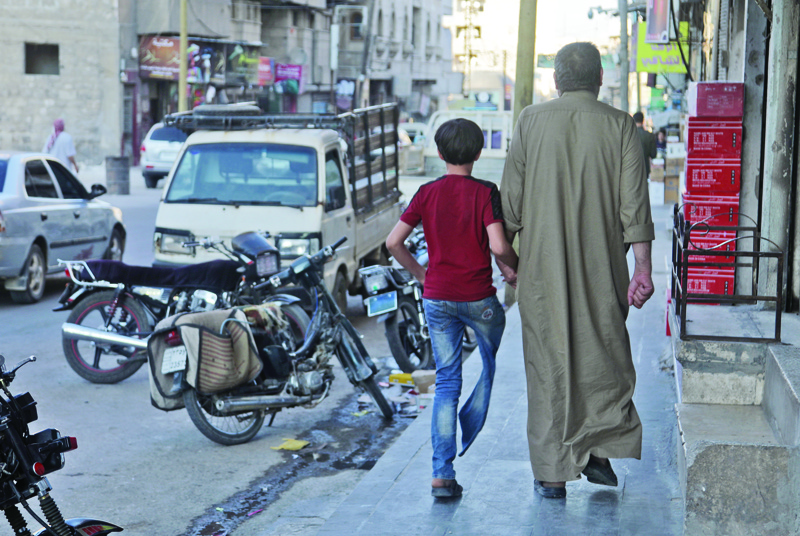 AL-BAB, Syria: Displaced Syrian Mustafa Shaaban Abu Khalil walks alongside his son who lost a leg due to bombing, on a street in the rebel-held city of al-Bab northwest of Aleppo in northern Syria. - AFP
AL-BAB, Syria: Displaced Syrian Mustafa Shaaban Abu Khalil walks alongside his son who lost a leg due to bombing, on a street in the rebel-held city of al-Bab northwest of Aleppo in northern Syria. - AFP
AL-BAB, Syria: In a camp in northwest Syria, Mohamad al-Abdullah relies on UN aid to treat a spinal injury that could have paralyzed him had it not been for cross-border aid. But that life-saving assistance is now threatened by a Russian veto. With Moscow threatening to shut the region's last crossing from Turkey at a UN Security Council vote in the coming days, the 17-year-old and millions like him risk losing a vital conduit for medical and food supplies.
"All my medicine comes from abroad through the crossing," Mohammad told AFP from his tent in the opposition-held Syrian town of Azaz. He still has pieces of shrapnel lodged in his back and ribs from a 2014 car bomb blast that wounded his spine, killed his father and prompted him to flee Deir Ezzor in Syria's east to seek refuge in the northwest.
"If (the shrapnel) moved only a millimeter, I would be paralyzed. That's what the doctors told me," he said. "If the crossing closes, I will sit idly in this tent, unable to move, because if it wasn't for my medicine, I wouldn't be able to stand up from the pain." The painkillers he desperately needs reach Azaz via the opposition-controlled Bab al-Hawa crossing on the Turkish border, the only entry point for UN assistance into Syria's beleaguered northwest.
But the resolution authorizing such deliveries expires on July 10 -- by which time the Security Council must have voted on its renewal. Damascus ally Moscow says the UN mandate on the border violates Syria's sovereignty, and wants to close Bab Al-Hawa when the current provision expires, re-routing aid through regime-controlled territory. The UN has warned that blocking aid via the crossing could cause a "humanitarian catastrophe".
'Medical crisis'
More than three million people live in the Idlib region in Syria's northwest, much of which is controlled by jihadists and allied rebels. Around 2.4 million people there need humanitarian aid, according to the UN. It says some 1,000 trucks have passed through the crossing every month over the past year, carrying in vital COVID-19 vaccines, hospital equipment and medicine for diabetes, tuberculosis and leishmaniasis.
NGOs have warned that re-routing such supplies through regime-held territory could lead to disaster. "The notion that the Syrian government can replace UN aid is absurd," Amnesty International's Syria researcher Diana Semaan said on Friday. There is currently no agreement between the UN and Damascus to authorize UN aid deliveries to the northwest from inside Syria.
Aid groups have repeatedly accused Damascus of hindering humanitarian assistance to areas outside its control. "The Syrian authorities have a long history of diverting and obstructing humanitarian aid," Amnesty International said in a statement. It warned against a "medical crisis" in the northwest similar to the one currently gripping northeastern Syria after the closure of another checkpoint there under Russian pressure last year.
Ireland and Norway, non-permanent members of the Security Council, presented a draft resolution Friday aiming to keep Bab Al-Hawa open for one year. Permanent members the United States, France and Britain had also wanted to reopen the nearby Bab al-Salam crossing with Turkey, which was shut last year, diplomats have said. The International Rescue Committee has pushed for Bab al-Salam to be reopened, arguing that "one crossing alone has proved insufficient to meet the scale of needs".
Price hikes
Sitting outside his shop in the town of Al-Bab, Mustafa Shaaban said his entire family relies on life-saving medicine delivered by the UN and its partners. The 57-year-old, who escaped a regime offensive on Aleppo city, said he injured his skull during Russian bombardment of Al-Bab years ago. The same attack killed his eldest son and blew off his other son's leg, forcing him to use a prosthetic limb. Separate shelling on their house wounded his grandson and his daughter, who underwent three intestinal surgeries and is now equipped with a stomach prosthesis.
She desperately needs drugs for the pain and for her stomach. "The effect on our family will be a big one," if Bab al-Hawa closes, he said. Back in Azaz, Ahmad Hamra, a displaced Syrian also from Aleppo, said he had lost both his legs in an airstrike on the city that killed his brother. He now takes daily doses of pain killers, which have seen price hikes amid a nationwide economic crisis. "I get all my medicine (for free) from clinics," the 37-year-old said from inside his tent in an Azaz displacement camp. "I can't afford to go and buy it from pharmacies." - AFP




